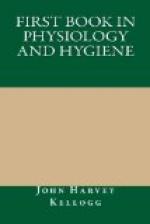SUMMARY.
1. Both animals and plants are sometimes diseased. Flesh obtained from sick or diseased animals is unfit for food.
2. Unripe, stale, and mouldy foods are unfit to be eaten and likely to cause severe illness.
3. Foods are sometimes spoiled by having things mixed with them which are not food, or which are poisonous.
4. The foods most liable to be adulterated in this way are milk, sugar, and butter.
5. Tobacco, while not actually eaten, is thought by some persons to be a food, but it is not. It is a poison, and injures all who use it.
6. Boys who use tobacco do not grow strong in body and mind.
CHAPTER VI.
OUR DRINKS.
1. Water is really the only drink. It is the only substance which will satisfy thirst. All other fluids which we drink consist mostly of water. Thus, lemonade is lemon-juice and water. Milk is chiefly water. Wine, beer, cider, and such liquids contain alcohol and many other things, mixed with water.
2. Why we Need Water.—If we should wet a sponge and lay it away, it would become dry in a few hours, as the water would pass off into the air. Our bodies are losing water all the time, and we need to drink to keep ourselves from drying up.
3. Water is also very necessary for other purposes. It softens our food so that we can chew and swallow it, and helps to carry it around in the body after it has been digested, in a way about which we shall learn in future lessons.
4. Still another use for water is to dissolve and wash out of our bodies, through the sweat of the skin, and in other ways, the waste and worn-out particles which are no longer of any use.
5. Impure Water.—Most waters have more or less substances dissolved in them. Water which has much lime in it is called hard water. Such water is not so good to drink, or for use in cooking, as soft water. That water is best which holds no substances in solution. Well-water sometimes contains substances which soak into wells from vaults or cesspools. Slops which are poured upon the ground soak down out of sight; but the foul substances which they contain are not destroyed. They remain in the soil, and when the rains come, they are washed down into the well if it is near by. You can see some of the things found in bad water in the illustration given on opposite page.
6. It is best not to drink iced water when the body is heated, or during meals. If it is necessary to drink very cold water, the bad effects may be avoided by sipping it very slowly.
7. Tea and Coffee.—Many people drink tea or coffee at their meals, and some persons think that these drinks are useful foods; but they really have little or no value as foods. Both tea and coffee contain a poison which, when separated in a pure form, is so deadly that a very small quantity is enough to kill a cat or a dog. This poison often does much harm to those who drink tea or coffee very strong for any great length of time.




